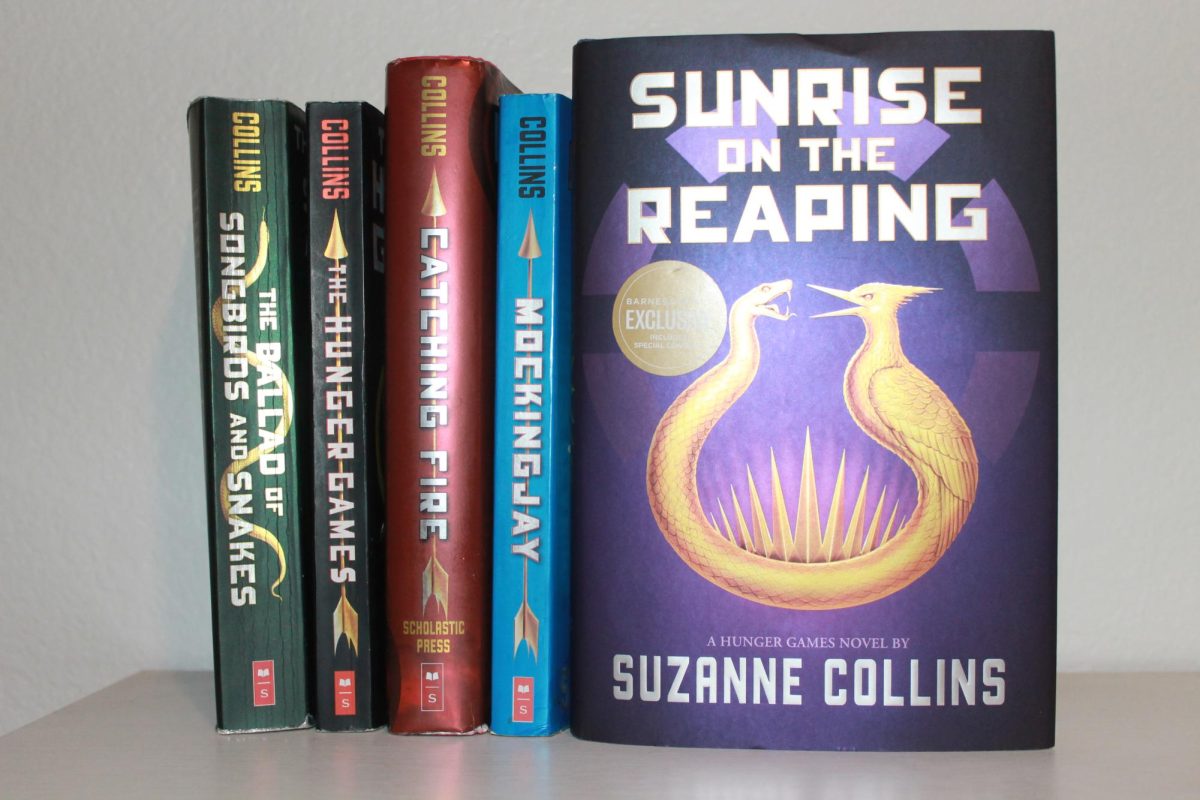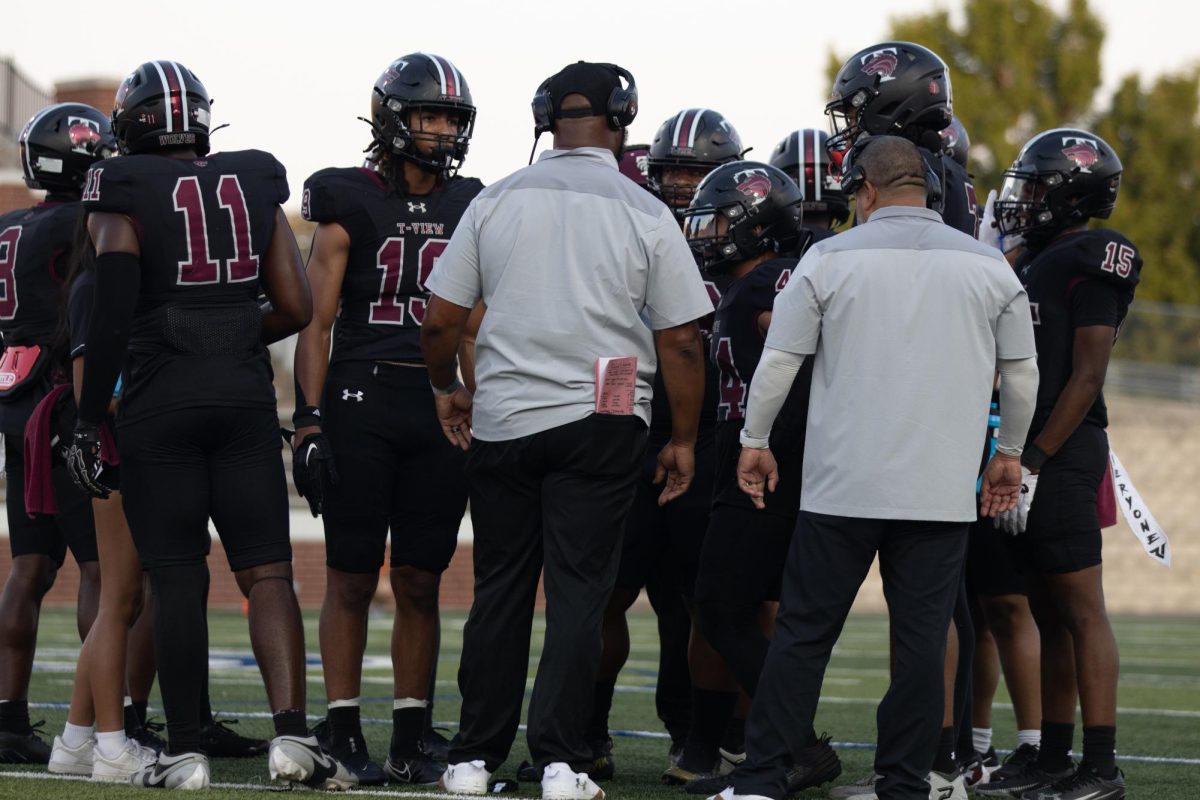Following in the footsteps of its preceding sequel, The Hunger Games, Sunrise on the Reaping sets itself apart with its return to the brutal world of Panem, offering more background to the nightmare that is the Hunger Games. The announcement of the book last October was met with excitement from the fandom, as this book focuses on the beloved character Haymitch Abernathy and is set during a Quarter Quell, a special version of the games that takes place every 25 years.
The Suzanne Collins book came out exclusively in hardcover on March 18 and retailed for $22. The book sold more than 1.5 million copies worldwide during its first week, according to the Connecticut Post. This was the biggest opening ever for the blockbuster series. In The Ballad of Songbirds and Snakes, Lucy Gray said, “I only sing when I have something to say.” This bit of dialogue can relate to the fan observation that Collins only writes when she has something to say. Her intentional writing of Sunrise on the Reaping and the social commentary found in it has impressed me yet again.
The book also features some modern themes of AI and the government manipulating the truth. Opening with quotes about truth, propaganda and control, the novel explores how the media shapes reality and reinforces power by focusing on how narratives can be controlled by people in power, and how videos can be edited to twist the truth.
This book gives us a look at how Panem’s wealth gap only worsened between the 10th, 50th and 74th games. Compared to the first book of The Hunger Games, the Capitol doesn’t seem as rich, and the districts don’t seem as poor. Unlike in The Ballad of Songbirds and Snakes, there are now accommodations, food, clothes and a training facility for the tributes; however, they aren’t near as luxurious as they were when Katniss arrived. Likewise, nothing is as big of a shock to the tributes as when we see it from Katniss’ perspective. For example, she had never tasted chocolate, while Haymitch had it on special occasions. The rich have become richer and the poor even poorer. This seems familiar in the way that the power and wealth divide, which mirrors that of our own society.
Sunrise on the Reaping does an amazing job in expanding our knowledge on The Hunger Games universe. It also makes us rethink all we knew about the games. It was really surprising to find the truth about how Haymitch is illegally reaped. The 50th Hunger Games isn’t random- it is calculated. When you realize that, you see the same probably happens for the 75th. The random selection of past victors is a lie, and those tributes are probably also illegally reaped, indefinitely showing, once again, that the Capitol has full control of everything all the time.
Haymitch’s games are also heavily edited. In the back of the Barnes and Noble Edition, which features an interview with Collins, she explains, “He can only wonder what they’re showing the audience. But the full force of their deception doesn’t hit him until he sees how completely they’ve changed his story.” This is another reminder of how easy it is to control the narrative. What the capitol shows isn’t the truth, or at least the full truth, much like how modern media filters and twists reality.
Haymitch is basically the first Katniss. He cheats the capitol, and they make him pay for it with his loved ones’ lives. He tells the reader, “And so I remain, forever trapped in my chamber. I am so desperate to forget. To escape the grief, the aching loneliness, the loss of those I love.” This really shows how evil and merciless the capitol is and how their punishment pushes him to become the shell of the man we meet on Katniss’s reaping day 24 years later.
As the wise Haymith later says in Catching Fire, “Nobody ever wins the games. Period. There are survivors. There’s no winners.” We see the truth in that now that we know more about former victors. The character Wiress, for example, won the games without killing anyone and got out just fine. As a punishment, she is placed as a mentor with the least successful and cared for district- 12. We see her original self, but after she helps Haymitch and is tortured beyond recognition, she becomes the broken version that is shown in Catching Fire.
Then there is Beetee who has to mentor his own son, Amperts, only to witness his brutal death. After Amperts is attacked by mutts, Haymitch narrates, “Then I turn back to what I am meant to witness. A small white skeleton, stripped clean to the bone. No flesh or clothing remained, only an ax at its right side, my knife at its left. My lips move, but no sound comes out.” Amperts’s death really highlights how inhumane the games are.
Something I noticed while reading was how similar Snow, Katniss and Haymitch are. All have deceased parents and a loved one they wanted to protect at one point. The difference with Haymitch is that he had a good life before the games with a family, a job, a lover until it was taken away from him, so he took the greatest loss in the books. As he reflects later on in Mocking Jay, “My mother and younger brother. My girl…They were all dead two weeks after I was crowned victor. Because of that stunt I pulled with the force field.’’
What made this book stand out from the others in the series is how deeply it made me care about everyone. All these characters show different sides of Panem’s society. It wasn’t just Haymitch but every tribute showed emotions, especially the allied group The Newcomers. Knowing only one of them would make it out was devastating.
The moment when Haymitch drops chocolate down for fellow tribute Silka when she’s crying against the tree is heartbreaking; this just shows how they’re both just scared kids that had their lives ruined. We also have the return of younger versions of key figures like Wiress. This really adds emotion and reinforces the theme that history is doomed to repeat itself unless someone breaks the cycle.
Haymitch is the spark and Katniss is the fire. Although he “fails,” he starts the spark to overthrow the capitol. The future we already know is foreshadowed in the interaction between him and Plutarch who said, “Haymitch we need someone exactly like you.” Haymitch replies, “Just luckier?” That someone comes along 24 years later- with the girl on fire. In the epilogue Peeta points out that Katniss is not an easy person and is like Haymitch, to which he reflects, “But she was smarter than me or luckier. She’s the one who finally kept that sun from rising.”
I will truly never get over this book, especially the epilogue, which shows Haymitch finally getting to tell his story: “Before I knew it, they all came tumbling out: family, tributes, friends, comrades in arms, everybody, even my love. I finally told our story.” The dedication to Lenore Dove was heartwarming. Haymitch calls Katniss “sweetheart” because she reminds him of Louella McCoy, “my sweetheart of old. And after she volunteered for the Games, that nickname couldn’t help but slip out.”
A few other details released in the epilogue were the history of Katniss’s mockingjay pin gifted to her by her friend Madge, Maysilee’s niece, who Haymitch “felt compelled to tell them about.” How Haymitch and Katniss’s dad were best friends, and how he thinks of Katniss and Peeta like his family after saying he won’t ever love, admitting that “the walls of a person’s heart are not impregnable, not if they have ever known love.”
This was one of the most cruel and heartbreaking books in the series. It’s also one of, if not, the best; it took the spot as one of my all time favorite books ever. It’s so powerful and beautifully written, and it reminds me to remain resilient. “The snow may fall, but the sun also rises.” The oppression may seem endless, but there will always be people who fight for light.










